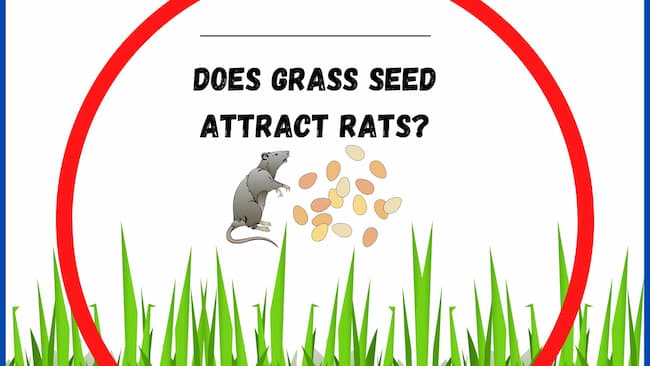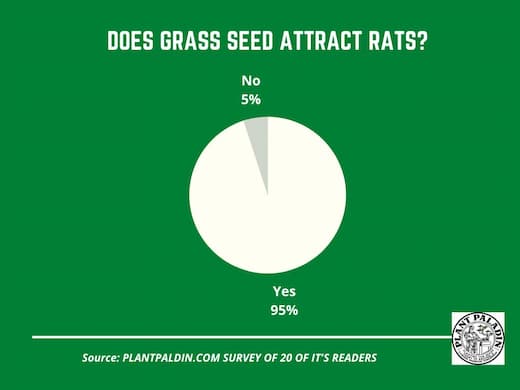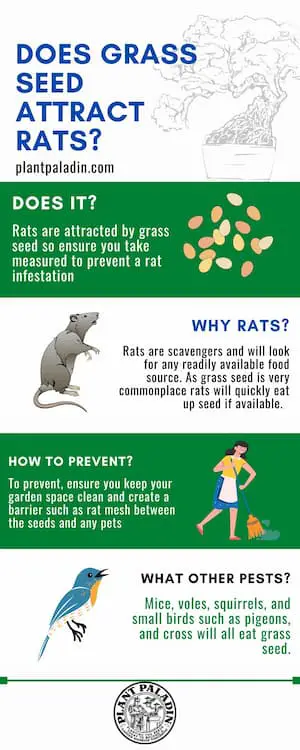This website is supported by its readers. If you click one of my links I may earn a commission. I am also a participant in the Amazon affiliates program and I will also earn a commission from qualified purchases.

Back in March, I moved house. While the new house had a large backyard, it was missing a rear lawn, so I invested in grass seed to help grow my new lawn. I was unprepared for the bugs, mice, and birds attracted to grass seeds. So does grass seed attracts rats?
Grass seeds can attract rats within the first five to ten days of planting as a food source. The seeds will not have sprouted and be easier to ingest and access by rats and mice. To prevent, use scares, rat traps, or pesticides to prevent rats from attacking your seed.
So why exactly does grass seed attract mice and rats? And what are the best ways to prevent rats from attacking your grass seed? Keep reading to find out more!
Just a quick heads up, over the past three years of running Plantpaladin, hundreds of people have asked for product recommendations. As such, You can find my favorite indoor bonsai tree here (link takes you to Bonsaiboy), my favorite outdoor bonsai tree (link takes you to Bonsaiboy), or have a look at all the products I recommend here.
Does grass seed attract rats?
So while seeding and growing your lawn can be hugely rewarding, one of the significant problems with leaving seeds exposed is the sheer amount of bugs, insects, and, most importantly, mice and rats that the seed will attract.
To understand why I contacted my local botanical gardens and a local pest control expert and surveyed five plant paladin readers to ask why rats are attracted to grass seed.
To summarize:
- Rats will indeed be attracted to grass seed.
- Rats are most commonly attracted to grass seed as a food source.
- Typically rats are not picky eaters and are omnivores meaning they will eat meat and vegetables regardless of where they are available.
- When grass seed is first plated, it takes 5 to 10 days to sprout.
- Before the seed sprouts, it will be at its most vulnerable, meaning that birds, mice, and rats will all eat as much of the seed as possible.
- Rats will also eat rat seeds once they have sprouted, resulting in grass that does not grow evenly.
- Keep your backyard or space near the grass seed clean to prevent rats from eating the seed. Cover the top of your lawn with rat mesh until the grass has grown, remove any nearby decking, or use scares, rat traps, or pesticides to get rid of any infestations for good.
- Ensure that any excess grass seed is stored in a rat-proof container. This will prevent mice or rats from returning to your home for food.
Why does grass seed attract rats?
The biggest reason why grass seed attracts rats is that it’s an easy food source.
Rats you see are omnivorous and will eat anything so long as it is easy to get. On top of this, rats will not just eat the grass seed when it has been freshly planted but will also gnaw on the grass as it starts to shoot from the seeds.
Rats are scavengers who will look for an easy meal wherever they can.
As such, if they find a place with grass seed, they will revisit it repeatedly as they have an easy food source without interruption.
How to prevent rats from being attracted to grass seeds?
So now we know why rats are attracted to grass seed; what can we do to prevent them from eating our seed?
Clean your backyard
Rats have a dirty reputation for a good reason; they love filth.
As such, look at the front/backyard where you have just planted your grass seed.
Does it look clean? Or is it surrounded by overgrown weeds, shrubs, and unkept trees?
If your green space is a bit of a mess, take the time or hire a professional to clean out your space.
This will attract fewer rats overall and will be much easier to maintain.
What should you remove?
Now reading the advice above, it can be easy to think you need to remove and clean out everything and slab over your garden to eliminate rats.
The truth is not everything needs to go and instead, pay attention to remove the following:
- Any excess wood or wood planks you have stacked against your fence – rats will use this to make a nest.
- Food material that may be sitting around your BBQ
- Trash bags in secure bins that rats cannot excess.
- Any fruit-bearing shrubs you may have that drop fruit, such as apples, citrus, or orange trees.
- Once harvested, sweetcorn, root vegetables, pumpkins, and squash should all be placed in a secure area.
- Remove or clean decking areas regularly, as rats like to nest under the decking.
- Remove Ivy, Juniper, Pine, or cypress trees – most evergreen trees make perfect rat nests.
Move the seed into a secure location.
So once the seed has been poured/planted in soil, many of us ( myself included) have a terrible habit of leaving any excess grass seed outside.
Sadly, the bags in which grass seed is contained is effortless to chew through by a rat.
As such, moving it into a secure indoor location is super important once you are done with your seed.
A metal box or glass bowl with a secure lid will work best.
Secure the grass seed
So what about the existing grass seed that you have planted?
After all, if you have followed the steps above, there is still a good chance that rats (the opportunistic creatures that they are) will still eat your grass seed.
In this instance, I suggest using a rat mesh to protect the seed.
Rat mesh is typically made of galvanized steel and is small enough to prevent rats from getting through to the seeds while having enough space for light to penetrate and feed the seeds.
Either create a protective perimeter made out of the wire mesh around the spot you have planted the grass seed or coat the seed with a thin, even layer of the wire mesh.
Use rat traps
Finally, the most potent method is to use rat traps.
Once again, you can use sticky rat traps around the perimeter of where you planted the grass seed.
You can then safely remove the rats into a new location.
Alternatively, if the problem will not go away, consider using rat poisons or other deterrents.
Contact a reputable pest control agent to avoid handling these chemicals directly.
What other animals are attracted to grass seed?
Sadly it’s not just rats that you have to worry about that are attracted to grass seed, so what other animals will attack and eat your grass seed?
Mice, voles, squirrels, small birds such as pigeons, crows, or hummingbirds, insects such as aphids, scales, or weevils are all attracted to grass seed. Each of these animals consumes the seed for sustenance.
Sadly then, it is mainly pests that consume grass seed.
What time of year will rats attack grass seeds?
Rats are most attracted to grass seeds in the spring or autumn. This is because most grass seed is planted at these times of the year, making them a lot easier for rats to attack when the seeds are smaller and more vulnerable.
Are rats attracted to long grass?
Rats are attracted to lawns with long grass, making for an ideal nesting location. Ensure then to trim your lawn regularly and keep your backyard clean and tidy to prevent a rat infestation.
How to store excess grass seed?
You should store excess grass seed away in a thick airlock container made of glass or metal. This will prevent rats, mice, and other pests from chewing through the container and consuming the seed and will also ensure that the seed does not dry out. This will ensure you can use the grass seed in the next growing season.
Avoid keeping grass seeds in the plastic bags they usually arrive in, as mice and rats can easily gnaw through that.
What happens if you do nothing?
Failing to take precautions from mice and rats attacking your grass seed at best will mean a lawn or grassy area that does not grow evenly.
This will mean you will need to re-sow the seeds several times, trimming the lawn space several times to grow out a green space of equal size.
In a worst-case scenario, failing to do anything could lead to a full-on rat infestation in your back garden.
Rats may decide to stay and nest in your green space long after the seed has been eaten.
Signs you have rats eating your grass seed?
The most significant signs you have rats eating your grass seed include rat droppings in your green space, an uneven growing lawn, bite marks on garden objects such as hoses, and footprints in and around your lawn.
Survey results
Finally, I reached out not only to five plant paladin readers who regularly use grass seeds but a few pest control experts, asking all of them if grass seeds attract rats.
This post was written by Fehed Nicass, who has been passionate about bonsai and gardening for over three years.
To summarize:

My top picks for the gear you will need!
So like I mentioned earlier, over the past three years of running PlantPaladin, hundreds of people have asked me for my recommendations on the best bonsai gear on the market.
Having spent thousands of dollars on bonsai items these past few years and tested at least 100 bonsai-specific products, I’ve listed my favorite products below – All of which I highly recommend and think you can get great value.
They can purchase directly by clicking the link to take them to Amazon.
Bonsai Tool Set: One of the significant challenges I’ve had is finding a toolset that was not only durable but didn’t break the bank. SOLIGT has recently developed a fantastic bonsai tool set that covers all the tools you need to trim, prune, and repot your trees. – You can grab it here.
Complete Bonsai Set: Many of you will want to grow your bonsai trees entirely from scratch, but finding the varicose seeds, pots, and other items in one place can be challenging. Leaves and Sole then have created a complete bonsai set that I’ve personally used that ticks all the boxes. You can grab it here.
Bonsai wire: The number of times I’ve run out of wire for my bonsai or purchased cheap bonsai wire that doesn’t do the job is embarrassing for me to admit. After a lot of trial and error, I found that using Hotop’s aluminum bonsai wire is one of the best options on the market. This can easily be used for both indoor and outdoor bonsai. You can grab it here.
This post was written by Fehed Nicass, who has been passionate about bonsai and gardening for over three years.

